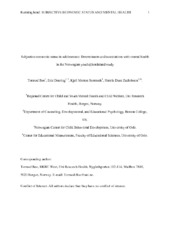Subjective economic status in adolescence: determinantsand associations with mental health in the Norwegian Youth@Hordaland Study
Peer reviewed, Journal article
Accepted version
Permanent lenke
https://hdl.handle.net/1956/17483Utgivelsesdato
2017Metadata
Vis full innførselSamlinger
Originalversjon
https://doi.org/10.1007/s10834-017-9553-4Sammendrag
We aimed to identify factors associated with perceived economic well-being (PEWB), and examine its association with symptoms of depression and attention-deficit/hyperactivity disorder. In the Norwegian youth@hordaland study, 9166 16–19-year-olds provided information on perceived economic well-being and relevant covariates. Information about families’ income-to-needs was obtained from tax return forms. Adolescents in households with a low income-to-needs ratio, with non-working parents, and in single-parent households were more likely to report poor PEWB. Adolescents with poor PEWB reported more symptoms of depression and ADHD, also after adjusting for covariates, including income-to-needs. There was a significant indirect effect of income-to-needs on mental health problems though PEWB. The current study demonstrates the role of PEWB as a contributor in the pathway from social inequalities to disparities in mental health.
